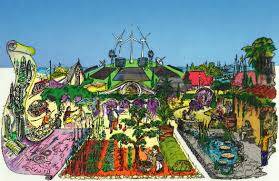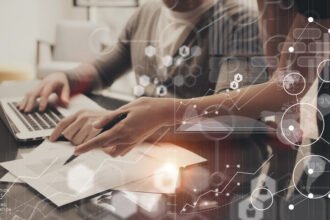 While the potential economic benefits of data are increasingly understood, there are many potential societal benefits from data that have received less attention. One important opportunity is to use data to build more sustainable communities, i.e. communities that use data to minimize their environmental impact.
While the potential economic benefits of data are increasingly understood, there are many potential societal benefits from data that have received less attention. One important opportunity is to use data to build more sustainable communities, i.e. communities that use data to minimize their environmental impact.
 While the potential economic benefits of data are increasingly understood, there are many potential societal benefits from data that have received less attention. One important opportunity is to use data to build more sustainable communities, i.e. communities that use data to minimize their environmental impact. Sustainability is the result of making better choices, and better data allows better decision-making. Specifically, data can be used to create more sustainable communities in at least three ways: more informed decisions, better optimized decisions, and automated decisions.
While the potential economic benefits of data are increasingly understood, there are many potential societal benefits from data that have received less attention. One important opportunity is to use data to build more sustainable communities, i.e. communities that use data to minimize their environmental impact. Sustainability is the result of making better choices, and better data allows better decision-making. Specifically, data can be used to create more sustainable communities in at least three ways: more informed decisions, better optimized decisions, and automated decisions.
First, new data allows more informed decision-making, both at the macro-level and the micro-level. The Internet of Things is creating a world alive with information where everything from roadways and cars to buildings and appliances collect data. Sensors embedded throughout our world will produce detailed, real-time data about our communities, including data such as air quality to water usage. These new sources of data will be more accurate, more precise, more reliable, and timelier than what is available today.
All this new data can be used to create feedback loops that allow individuals and businesses to make more environmentally-conscious decisions. One example of this is building energy efficiency. Tenants are less willing to pay a premium for energy improvements if the results cannot be measured. Better data about building energy usage will both help identify opportunities to cut waste and help encourage a market-based system that rewards building owners for investing in technologies that improve energy efficiency.
New data can also help address air quality. Pollution levels vary widely within an urban area, influenced by factors such as weather and traffic flows. Low-cost, wireless devices like the Air Quality Egg make it easy to collect granular, real-time data on air quality from a multitude of locations within a city. The data can then be aggregated and turned into useful applications, such as a mapping tool to help bikers, runners, and outdoor workers avoid particularly problematic areas in the city.
Similarly, data from Internet-connected devices can help reduce water usage. In the United States alone,household leaks waste more than 1 trillion gallons of water annually. Wally, a system of in-home sensors designed to detect plumbing leaks and alert homeowners of the need for repairs, is an example of how data-driven technologies can have an impact on sustainability.
Second, data, combined with simulations and predictive modeling, can be used to optimize decisions and make certain processes more efficient. One example of this is the deployment of BigBelly trash cans—solar-powered trash compactors that alert sanitation crews when they are full. After installing these on its campus, Boston University found that it reduced the number off weekly pickups from an average of 14 to less than 2. The university not only saves time, but it also saves energy since its trash collectors are using fewer garbage bags and producing less CO2 during weekly trash pickups.
Data-driven modeling can also help city planners develop efficient traffic management programs to reduce traffic and get idling cars off the road. In the past, most of the traffic lights in a city were preprogrammed base on a small sample of data. Increasingly, cities are investigating how to use a variety of technologies to collect and store detailed data about traffic patterns over time. Transportation engineers can then analyze the data to identify opportunities to optimize traffic signals so as to reduce accidents and congestion. For example, researchers in Madrid have experimented with remote sensing systems that allow them to measure the emissions of vehicles in real-time. Not only can they ticket vehicles with terrible emissions, they can also measure the impact of different traffic policies and choose the one that is most effective.
Third, data can be combined with smart devices to automate many decisions. A simple example of this is sensors that turn off the lights when a room is empty or when there is sufficient daylight. Although this technology has been available for many years, it is now more affordable and more accurate. Depending on the type of room (e.g., a public restroom versus a conference room), using automated lights can reduce energy consumption by between 20 to 70 percent. Similarly, devices like the smart thermostat Nest are helping to reduce residential energy usage by optimizing heating and cooling systems automatically when nobody is home. With the growing deployment of smart meters that provide dynamic pricing for electricity, these types of automated building controls will likely become more popular. Finally, on the roadways, data might someday help city planners better manage urban pollution, such as by having hybrid vehicles automatically switch to electricity when in school zones, near hospitals, or in high-pollution areas.
An interesting example of all three of these types of decisions comes from the private sector. Tesco recently decided to start collecting data on how its chain of grocery stores in Ireland used energy, specifically looking at refrigeration, heating, and lighting. First, the company started collecting data from its refrigerators and discovered that they were running at temperatures much colder than they thought. Armed with this new information, the company adjusted its refrigerators to reduce their energy usage by 20 percent. Second, Tesco started tracking the temperatures in its stores and discovered that they varied widely. The company analyzed the data and found it could cut back on unnecessary heating and cooling costs before the doors opened each day. Third, the company decided it could save energy by automating its lighting systems so that the lights dim when there are no customers in a particular area of the store.
As the examples above show, already we are seeing how data-driven innovation can be used to increase energy efficiency, reduce water consumption, and improve air and water pollution monitoring. As more communities begin investing in data analytics and the sensor-based devices that make up the Internet of Things, there will be a number of opportunities to leverage this technology to create smart, sustainable cities. However, this transformation will not occur overnight. Many of these projects require a high degree of coordination, especially those designed to scale to a large portion of the population. Building smart cities will require cooperation between industry and government.
If the past is any guide, the success of many of these projects will depend on communities having technology champions who push for these changes. In the coming years, the most sustainable communities are likely going to be the ones where policymakers advocate vocally for technology adoption, encourage data sharing, and embrace data-driven innovation.








